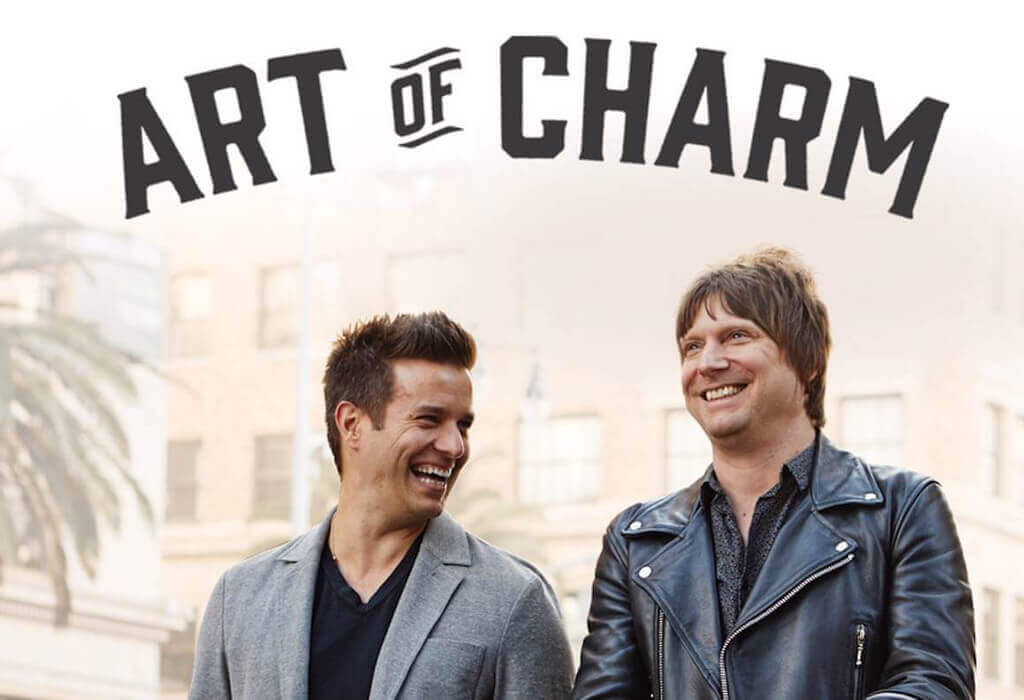Finding a personal coach is one of the most important decisions you’ll ever make. That relationship has the potential to change your life and set you on a course to accomplish extraordinary things.
But making the right choice isn’t always easy. It requires research, communication, observation and instinct. It can get a little overwhelming and difficult, especially in today’s market.
So as you consider your coaching options, I wanted to share my thoughts on how to evaluate different programs. These are based on my own experiences as a student and my years building The Art of Charm into a leading self-development program for men. I hope that they shed some light on what makes for a great program and help you find an extraordinary coach.
 Explore the coach’s life.
Explore the coach’s life.
The first way to assess a coaching program is to look at the coaches designing and teaching the material.
Ask yourself: Do the coaches I’m talking to live up to the values, philosophy and curriculum they teach?
Or do they teach something that doesn’t line up with their personal experience and their quality of life?
Finding a personal coach is all about patience and research. Start with the vibe you get on the phone and by email. Do you get the sense that they’re speaking to you with kindness, understanding, generosity? Or does the conversation feel transactional, perfunctory, maybe even a little manipulative?
Use your instinct here. It’s telling you the truth.
Beyond your direct communications, do some additional research. Jump on Twitter, Facebook and Instagram and get a sense of your prospective coaches’ lives.
Are they fun, social, outgoing? Reflective, interesting and curious? Intense, hardworking, ambitious?
Their social presence will tell you a great deal about who they are.
I’m not telling you what your coaches should be like—that’s up to you!—only that their personas should match the results they promise and the experience you’d like to have in their program.
Because if a coach’s personal life doesn’t square with what he teaches, then that’s a major red flag.
I recently reconnected with an old acquaintance who is now offering personal coaching for solo entrepreneurs. One of his upcoming workshops was about how to climb out of debt, consistently earn money, and save as much as possible.
I remember this guy distinctly. He was terrible with money, always in debt, and constantly overspending.
Now, that could be a great credential for a financial coach: “I used to be terrible with money, then I learned how to manage it, so let me teach you how.”
But it only took me a few minutes to discover that he wasn’t any better with money these days—he was only better at teaching other people who are bad with money too. The only thing that changed was that he had packaged a financial curriculum for other people who desperately needed it, but had failed to put it into practice in his own life first. He wasn’t good; he was crafty. In reality, he should have been a student of his own class.
Unfortunately, that describes a lot of personal coaches out there.
So look for the values and traits that reflect the curriculum you’re considering. I’m proud to say here at AOC, where we teach a philosophy of openness, generosity and fun, that all of our coaches embody those qualities to the fullest. You can feel it in every phone call, every podcast episode and every program.
If you didn’t, we’d just be pretending. Our students, who are smart and curious people, would immediately know it.
Get to know the students.
I’m convinced that we’re now witnessing a massive personal coaching Ponzi scheme.
The Ponzi scheme in personal coaching works like this.
People—most of them pretty smart, hard working, and often well intentioned—realize that they can sell their expertise to other people. So they open a personal coaching business and sign up clients to teach them the particular system they offer.
At the same time, other people are realizing that they can be personal coaches too. There’s no required certification process, no legal requirement, no mandatory credential. The industry is wide open.
So the market explodes. People realize that they can jump into this coaching game, and now there are thousands and thousands of personal coaches out there.
Now these coaches need clients.
So whom do they go after?
More and more, they go after other personal coaches. Many personal coaches are themselves clients of other coaches, because these aspiring coaches believe they need a coach in order to convince other people they need a coach.
And that’s the Ponzi scheme: a system in which a coach serves his clients by helping them make money coaching other coaches. As long as there are more aspiring coaches out there looking for their own coaches, the scheme continues.
Which is why, if you step into a random personal coaching workshop anywhere in the world, you will find a disturbingly high proportion of aspiring coaches in the classroom. Tons of coaches are just teaching other coaches.
And in that way, it’s a weird logic loop where these coaches can become quite successful by teaching the same thing they’re picking up, to people just like them.
Am I saying that all personal coaches only coach other coaches, or that coaches who coach other coaches are total frauds?
Definitely not.
But I am saying that if a high proportion of a coach’s clients are other coaches, then that’s a red flag.
Instead, see if a coach’s clientele looks like you.
If you’re an entrepreneur, do they coach other entrepreneurs?
If you’re an artist, do they coach other artists?
If you’re at a career crossroads, do they coach people who are confronting their choices and making smart ones?
And are those people growing, becoming successful, developing as professionals, and generally becoming happier and more fulfilled?
If so, then that’s a good sign that you’ve found the right coach for you.
Analyze the testimonials.
Testimonials are absolutely essential when finding a personal coach. But because they are deliberately curated by the coach, they are also very tricky.
Your job is to separate the genuine praise from the thin acknowledgement. This is more instinct than science, but there are a few criteria you can use to judge a good testimonial.
- Is it specific? Does it refer to particular exercises, breakthroughs or benefits? How detailed are the examples? Do they give you a vivid sense of the program and how the sessions will help you, or does it only touch on vague results?
One of our most memorable testimonials talked about limiting beliefs, those deeply ingrained thoughts that hold us back. “During an exercise to ask 50 strangers a question,” he wrote, “I suddenly realized the smiles and positive reactions had completely changed how I feel about approaching people I don’t know. Something I was inhibited from doing all my life is now enjoyable and second nature.”
Reflections like these get to the nuts and bolts of the curriculum. So be on the look out for specific exercises and experiences in testimonials.
- Is it emotional? Truly good coaching elicits strong emotional responses from clients—happiness, excitement, gratitude, awe. Do the testimonials sound like clients are truly moved? Are the coach’s clients inspired, engaged, and proud?
One of our clients recently wrote us a note saying, “This is one of those things that’s probably insignificant to a lot of people, but I’ve never felt so loved on my birthday before this year.” That might seem small, but it speaks volumes. He then added, “I don’t think I’ll ever be able to stop thanking you for everything you’ve enabled me to do, have, and go after.” Our other testimonials have a general sense of excitement, optimism and renewed hope. Those are the deeper emotional reactions you should expect of great coaching.
- Is it results-oriented? Clients of good coaches should see concrete change in their lives after coaching. Do the testimonials mention new jobs, partners, opportunities? Have the clients’ lives changed as a result?
One of my favorite testimonials from a client included his frustration about being late to appointments because he’s now constantly making friends with strangers on the street. Another talked about meeting a fantastic girl in the airport on his way home, landing his dream job in a new city, and proposing to that same girl several months later. Still others talk about putting our curriculum into practice in job interviews, boardrooms, bedrooms, and family get-togethers, with remarkable detail. That’s the kind of specificity you want.
- Is it unexpected? Good coaching delivers on what it promises, but great coaching delivers in ways you could never have anticipated. Becoming extraordinary with women, for example, is one of the core skills we teach in our programs, but it’s actually a small piece of a much larger transformation.
One of our students recently left a testimonial saying that “I came to The Art of Charm to get better with women, and that happened. I was really shocked to find that it also led me to my true self.” Another said that a program changed “my overall outlook for the future.” If we had advertised these outcomes, it would have sounded like hyperbole, but these are the real benefits of out program.
So when you go about finding a personal coach, look for the unexpected discoveries as well as the intended results in client testimonials. They usually indicate the true transformation underneath the core curriculum.
- Is it verifiable? Many of our clients leave their phone numbers in their testimonials so prospective clients can reach them and discuss the program. Others mention that the only thing better than their Art of Charm program was their second Art of Charm program.
To me, that kind of accountability is important. It keeps us honest, and it allows our students to do their homework before they sign up. Contacting students and looking for consistent reactions to the program are two easy and important ways to assess a testimonial. Make sure that you can confirm what a prospective coach is telling you.
Along the way, make sure that the testimonials really speak to you. Can you see yourself in their statements? Are these clients the kind of person you’d like to be? Would you like to leave a program feeling the way they did, with their level of specificity, emotion and results?
If so, then that’s a good indication that the coaching program is for you.
Test the curriculum.
Every coach’s material is different, and every coach subscribes to a different philosophy of self-improvement. That can make it difficult to assess a curriculum, especially if you’re new to the program, as most students are.
The previous sections are great ways to assess a curriculum without actually having experience with it. If the coaches embody the principles they teach, the alumni of the program are successful, and the testimonials are solid, then these are all indications that the curriculum works.
That will help steer you toward the right choice. But because we can’t talk about every program under the sun, let’s touch on a few easy, smart questions you can ask to evaluate the quality of any program.
- Is it surface-level or deep? You want a program that gets to the foundations of the skills you want, rather than just cosmetics. If you’re considering a public-speaking workshop, for example, avoid the coach who just tells you to project your voice and stand up straight. You want the coach who will get deep into your self-perception, explore your fears of speaking, and discover your authentic presence and style. Exercises should get deep and personal, and should never remain at the level of theory.
- Is it truly original or a remixed curriculum? If you do enough research, you’ll begin to discover a handful of popular theories and exercises floating around the coaching industry. Many coaches simply repackage other people’s material, or adapt it slightly for their purposes. Look for material and exercises that are truly unique and clearly tailored to the material. That’s an indication that the coach knows what he’s doing, and that he has developed material that is unique to his program.
- Is it practical and actionable? Too many programs leave students with little to put into practice. Make sure the coach’s material gives you concrete skills, behaviors and exercises to work with. Ask yourself whether you’d be able to put them into practice after you leave the program. If the material has a practical use after you leave the classroom, that’s a sign of a good curriculum.
- Is it designed to make you feel good, or is it designed to make you good? It’s hard to overstate just how important this is. Many coaches are gifted at building people up without truly delivering results. Look for the ways in which a coach motivates, excites or reinforces you simply for the sake of making you feel good. This is not to say that you shouldn’t feel good when you get coached—you absolutely should, and that is also an important criterion. But you want to feel good because you are getting good, not because the coach is looking to give you a boost. The truth is, if you are truly improving (which can be a difficult process if true growth is occurring), then you will ultimately feel great, and not just because the coach is being kind to you.
—
So there you have it: my personal tips and criteria to assess any coaching product in the market.
Whether you choose to join one of our programs or not, these criteria will help you find the right coach for you. They will also help you find teachers, partners and mentors in any field.
As a coach who believes in fun, meaningful, permanent change, I am biased toward programs that are sophisticated, deep and original. I believe that coaches should deliver on the transformation they promise, because that’s what we deliver at The Art of Charm. I hope you ask us these questions as much as I encourage you to ask them of other coaches.
Best of luck in seeking and finding a personal coach, and reach out to me anytime if I can help you along the way!



